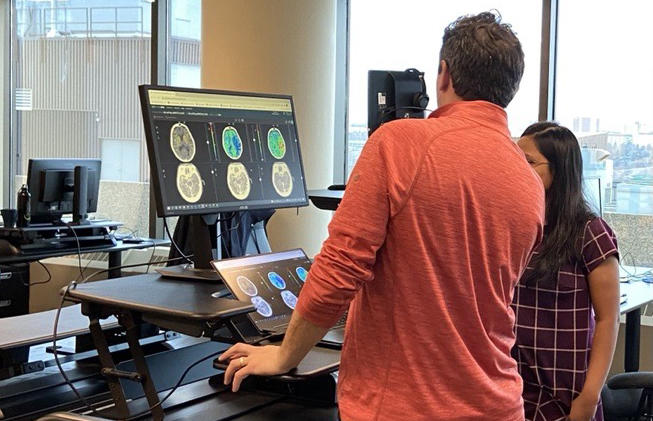March 29, 2022
UCalgary startup transforms the future of stroke diagnosis and treatment

When it comes to stroke, time lost is brain lost. Thanks to an innovative technology developed by UCalgary researchers in collaboration with a Calgary-based startup, frontline health-care clinicians will soon have the ability to identify stroke more quickly, while making faster, more accurate decisions to treat patients.
Circle Neurovascular Imaging (Circle NVI) was founded by leading stroke researchers from the University of Calgary and Calgary Stroke Program, including co-founders Dr. Michael Hill, Dr. Bijoy Menon, Dr. Andrew Demchuk, with local health technology leader Circle Cardiovascular Imaging.
- Photo above: Neurologist-researchers Dr. Petra Cimflova, MD, PhD, centre, and Dr. Nishita Singh, MD, PhD, are Calgary Stroke Program postdoctoral fellows whose research supported the Health Canada approval of StrokeSENS. Dr. Chris Duszynski, PhD’20, is a UCalgary alumnus who helps to lead Circle NVI’s efforts. Photo by Adrian Shellard, for the University of Calgary
Stroke is a leading cause of death globally, and Circle NVI is on a mission to improve the outcomes of stroke patients through its clinically validated StrokeSENS technology, which recently received Health Canada clearance.
Designed to bring timely diagnostic expertise to support frontline physician decision-making and collaboration, StrokeSENS uses AI-assisted advanced technology to identify the right treatments for patients faster than traditional methods, and can instantaneously share that information across treatment teams for improved patient care.
Global thought leaders
“The University of Calgary and members of the Calgary Stroke Program are thought leaders globally,” says Richard Clark, CEO, Circle NVI. “This group has been leading innovation for decades, and those innovations are used around the world to diagnose and treat stroke.”
Worldwide, 15 million strokes occur each year — there is one every nine minutes in Canada. The results of stroke can be devastating. When someone experiences stroke, the sudden loss of blood flow causes a region of the brain to die, which can permanently affect speech, vision, balance and movement. Every minute without care can impact a person for the rest of their life.
“We set out to create a technology that would utilize imaging to make faster decisions for patient care and treatment,” says Clark. “The result of faster diagnostics is improved patient outcomes. But it also reduces the burden on the health-care system by supporting effective patient transport decisions.”
Not every stroke patient has access to acute medical care
Stroke happens everywhere, but expertise to diagnose and treat stroke is only at central sites, primarily in the largest urban centres. When stroke happens in remote and rural areas, it can be challenging for general frontline clinicians to identify.
Circle NVI’s StrokeSENS technology is software that can take imaging directly from a CT scanner. “CT image interpretation is difficult, especially for those who aren’t trained in this area. StrokeSENS aids those frontline clinicians by using artificial intelligence to support collaboration amongst experts in the field, with the aim of increasing access to timely treatment,” says Clark. “This is critical in areas where specialized expertise is not available, and helps to solve access to specialized care in challenging geographies.”
An investment in innovation
The roots run deep for Circle NVI in the UCalgary innovation ecosystem. From vision, discovery and invention to entrepreneurship, intellectual property and commercialization, Circle NVI represents the successful commercial implementation of a UCalgary developed technology, from bench to bedside.

Chris Duszynski discusses the StrokeSENS technology with medical affairs manager Najratun Pinky.
Melanie McDonald, University of Calgary
Over half of the company’s employees are UCalgary alumni, and it’s a subsidiary of Circle Cardiovascular Imaging (Circle CVI), another ground-breaking startup out of UCalgary more than 15 years ago. Circle CVI is the global leader in cardiac imaging solutions and has revolutionized cardiovascular health care.
UCalgary’s innovation company, Innovate Calgary, has been a supporter and stakeholder in both companies’ journey since day one. Innovate Calgary made an investment in Circle CVI when it was an early-stage startup, and the UCeed Health Fund recently completed an investment in Circle NVI. Additionally, Thoma Bravo, one of the world’s largest private equity firms, made a strategic growth investment in Circle CVI to further extend its market leadership position and fuel future growth.
“It’s critical for us to support the discovery of new ideas and the creation of early-stage startups,” says John Wilson, CEO, Innovate Calgary. “UCeed investee companies are making a real impact on the economy, and the community. Through financial investment and access to resources, facilities, and expert guidance, we are advancing the startups and leaders that will shape Alberta’s future.”
With investment from the UCeed Health Fund, and participation from a leading Canadian research institute, Circle NVI is eager to enter the next phase of growth. “From a validation perspective, and what we are trying to build here in Calgary, this investment will stimulate growth and support taking our product to market,” says Clark.
In addition to Health Canada clearance, Circle NVI has FDA clearance and a deal with GE Healthcare to implement its technology across its health systems, to help frontline clinicians in the triage and diagnosis of acute stroke. “We want to evolve this space with innovation and bring greater access to care globally.”
The Calgary Stroke Program continues to revolutionize the prevention and treatment of stroke. It is a collaboration between the Cumming School of Medicine’s Hotchkiss Brain Institute, the Department of Clinical Neurosciences, and Alberta Health Services.
UCeed is a group of early-stage investment funds, backed by philanthropic support, accelerating UCalgary and community-based startup companies to advance problem-solving research, create jobs and fuel the economy. A key program in the UCalgary innovation ecosystem, UCeed bridges the gap between innovation, demonstration and commercialization, and is managed by UCalgary’s knowledge-transfer and business incubator, Innovate Calgary.
UCeed Health Fund is supported by the generosity of the River Fund at the Calgary Foundation and their mission to build a healthy and vibrant community where everyone belongs.






